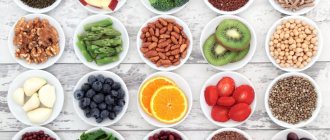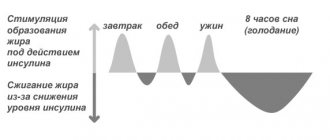From the moment of conception, a fetus begins to develop inside a woman, which from a microscopic cell after nine months turns into a child weighing more than three kilograms. It requires a wide variety of minerals and nutrients to build its body. The fetus ripening inside the mother’s womb can receive all these substances only from what she eats. Therefore, nutrition for pregnant women is of primary importance for the normal development of the fetus.
The prenatal period is the time when the skeleton is built, organs, the circulatory and nervous systems are formed. The lack of any substances in the diet will certainly affect the baby’s health and leave an imprint on his entire life. The same can be said about the presence of harmful substances that the mother can receive in the form of low-quality products, from the environment, drinking alcohol, cigarettes, drugs, medications and dietary supplements prohibited for pregnant women.
Normal level
Over 40 weeks, representatives of the fairer sex gain from 7 to 14 kg. The rate of weight gain is determined by the following indicators:
- BMI;
- initial body weight;
- body type;
- features of pregnancy;
- presence of concomitant diseases.
Without taking into account the weight of the fetus, the gain of kilograms occurs due to the growth of the placenta, female organs, increase in blood volume, as well as due to fat deposits, which are intensively deposited as a reserve energy resource. If a pregnant woman has not lost weight, but, on the contrary, in the 1st trimester she added more than 4 kg, and in the 2nd trimester she accumulated 500 g each week, there is reason to think about losing weight.
Pregnancy and excess weight
The world around us is rapidly changing, and these changes, alas, are not always for the better. Just a little over 40 years ago, many slender people lived on our planet. In the 21st century, obesity has become one of the most important public health problems. The only exception is a small number of countries where the fight against hunger continues.
When does “excess weight” begin?
The term “obesity” literally means “excess fat,” but it is impossible to determine the amount of adipose tissue in the body by eye. That is why a very simple method is used in practice - calculating BMI (body mass index).
BMI is an indicator that allows you to assess the correspondence between a person’s body weight and his height. BMI is calculated using the formula m/h2, where m is weight in kilograms, h is height in meters. For example, if a patient is 160 cm tall and weighs 55 kg, then BMI = 55/1.622 = 21.48 kg/m2.
Even if a woman feels fat or overweight, with a BMI of less than 25 kg/m2, there is no need to worry - this is the norm. If your BMI is between 25 and 30 kg/m2, doctors say you are overweight. The diagnosis of obesity is made when a BMI is over 30 kg/m2.
Obesity degree I - BMI ≥ 30 to 35, degree II - BMI ≥ 35 to 40, degree III - BMI ≥ 40.
Obesity is a serious disease that threatens the development of a large number of complications: from increased blood pressure to severe damage to the liver, joints, urinary incontinence and immobility.
Read also: Proper nutrition during pregnancy
Obstetric problems of obesity
Adipose tissue is an active endocrine organ. It is not at all surprising that excess adipose tissue affects the course of pregnancy and childbirth. Poor circulation in the “mother-placenta-fetus” system, intrauterine fetal growth retardation, and preeclampsia often accompany the course of pregnancy in obese patients. They are significantly more likely to have miscarriages in early pregnancy and gestational diabetes mellitus.
Due to the high risk of obstetric complications, doctors more often “induce” labor or urgently end the pregnancy with a caesarean section. However, if labor has already begun, the duration of the pushing period does not depend on body weight. Both skinny and chubby people push for approximately the same number of hours.
Medical difficulties
Obesity in pregnant women greatly complicates ultrasound examinations of the fetus. Even modern and sensitive sensors have difficulty penetrating massive accumulations of fat in the anterior abdominal wall, worsening the diagnosis of congenital malformations by 20%.
Drug treatment is not always effective, since the usual dosage may not be enough. A simple recalculation of the dose per kilogram of weight (and its corresponding increase) can lead to the development of toxic reactions. Even routine blood pressure measurement in obese pregnant women requires a special tonometer with a large cuff.
Doctors face serious difficulties when performing surgical operations. A special wide, heavy-duty table and surgical instruments with extended handles may be needed. The surgeon makes his way through the thick layer of fat on the anterior abdominal wall and works at a considerable depth.
When performing a cesarean section, it takes longer from the incision to the extraction of the fetus, and blood loss increases. Anesthesiologists have difficulty intubating and administering spinal anesthesia. In the postoperative period, the risk of wound infections, endometritis and thrombotic complications is higher.
How does this affect the child?
The risk of developing birth defects, including neural tube defects, heart defects, cleft palate and cleft lip, and limb abnormalities, increases significantly. It is not for nothing that obese patients are by default included in the risk group for developing congenital malformations and should start taking at least 1 mg (1000 mcg) of folic acid daily at least 3 months before conception (during pregnancy, the dose can be adjusted according to the situation).
If one of the parents is obese, the risk of obesity in the child increases by 2-3 times, but if both parents are obese, the risk increases by 15 times, providing the offspring with “all the delights of life” in the form of diabetes, cardiovascular diseases and arterial hypertension.
There is growing evidence that in utero exposure to maternal obesity in combination with high-fat breast milk is associated with the development of mental disorders in children, such as cognitive impairment, autism spectrum disorder, attention deficit hyperactivity disorder, anxiety and depression, schizophrenia and disorders eating behavior.
It is obvious that it is necessary to lose weight before the desired pregnancy, but this goal is not always easy to achieve. Nevertheless, careful preconception preparation can prevent a number of serious adverse events and allow a woman to enjoy the joy of motherhood.
Oksana Bogdashevskaya
Photo istockphoto.com
Where to start?
First you need to evaluate your eating habits and diet. Having determined what kind of food a representative of the weaker half of humanity takes during the day, they analyze how many servings and what products are obtained. Then gradually introduce new principles of nutrition. For example, replace sweet foods with fruits, eat slowly, or add vegetables to the menu. It is recommended not to reduce the amount of food, but to eat a more varied diet. It is important to know that strict calorie-reducing diets are contraindicated at any stage of pregnancy. The average energy value of food should be about 2000 kcal.
Useful products
Food is introduced into the diet that saturates the expectant mother’s body with useful elements, but allows her to avoid gaining unnecessary kilograms. A woman will lose weight during pregnancy if she eats:
- various vegetables. It is better to prefer local and seasonal fruits, and in winter supplement the menu with foods made from frozen raw materials. Potatoes are consumed in moderation;
- meat - every day, preferably dietary and lean. It is better to eat chicken and fish several times a week. In the last stages of pregnancy, the intake of meat products should be reduced to improve the elasticity of tissue in the perineal area;
- berries and fruits - any. Bananas and grapes are consumed only in moderation - they contain a lot of sugar. Among dried fruits, it is worth highlighting potassium-rich dried apricots and raisins, as well as prunes, which stimulate the intestines;
- eggs;
- fermented milk products;
- cereals, beans, whole grain bread, and durum wheat pasta;
- vegetable oils (from flax, sunflower, olives or corn).
It is preferable to steam, boil, bake or stew food.
Prohibited product range
The “lose weight during pregnancy” program excludes the intake of the following products:
- semi-finished products;
- pickles;
- marinades;
- sweets (bakery, confectionery, soda);
- canned food;
- grill;
- fat meat;
- fast food;
- products overly saturated with preservatives and food chemicals.
Drinking regime
It is important to drink enough liquid - about 1.5 liters of water, compotes or teas. It is better to prepare juices at home yourself, because packaged versions contain a large amount of sugar. If swelling appears, consult a doctor to correct fluid intake.
Nutrition rules
Nutritionists give advice on how to lose weight during pregnancy so as not to harm your body and the health of your unborn baby:
- the most high-calorie and poorly digestible food is taken in the first half of the day, and in the evening they eat light meals;
- do not eat after 19.00, because at this time the body prepares for sleep. If you feel hungry, snack on bran, dried fruits or nuts. Once in the stomach, they swell and give a feeling of fullness, while having great energy value;
- in the last trimester it is useful to eat an assortment of vegetables and fruits in unprocessed form;
- carefully control the quality of consumed products and diversify the menu;
- reduce salt intake to a minimum - this will lead to an increase in fluid intake;
- reduce heat treatment of products to a minimum
Sports activity
How to lose weight during pregnancy through exercise? Light exercise plays a significant role in maintaining normal weight in pregnant women. In good health, it is recommended to do moderate aerobic exercise for about 2.5 hours per week. The training will reduce the pain associated with this position, normalize sleep, stabilize the emotional state, and also reduce the risk of complications. Good options are swimming, dancing or slow walking. You should avoid exercise where there is a risk of getting hit in the stomach (basketball) and avoid activities with an increased risk of falling (horse riding).
Before you start exercising, it is advisable to consult a doctor. If any unforeseen situations arise in the form of bleeding or other abnormalities, exercise should be stopped immediately.
A balanced diet during pregnancy is an important condition for the health of the mother and baby, normal well-being and rapid recovery after childbirth.
If you have difficulties getting rid of extra pounds while carrying a child, it is recommended to consult a specialist who has the necessary knowledge in nutritional support for pregnant women. The support of a professional will help you lose weight in safe and healthy ways.
Features of the diet during pregnancy
It is generally very important for a person to eat right at any stage of life. If the expectant mother eats irrationally, incorrectly, with poor foods, poor in vitamins, proteins, and fiber, then she thereby harms her health. Being underweight or obese often causes infertility and is guaranteed to reduce fertility. Alcohol and cigarettes also affect a woman’s reproductive abilities. If the expectant mother smokes, she usually stops when she finds out that she is pregnant. But in this case, quitting nicotine always occurs after the fact. In other words, the embryo is already experiencing its negative influence.
When talking about proper nutrition for pregnant women, we must first talk about the lifestyle and eating habits of women before they see two lines on the test. It is very important that pregnancy occurs when the female body is fully ready to accept such a load and cope with childbearing function.
By and large, proper nutrition for a pregnant woman is no different from a normal healthy diet, which is recommended for all people. The only difference may be that the total calorie content during gestation may be slightly higher. At the same time, you need to eat fractionally in order to ensure a constant flow of nutrients to the fetus.
Nature is wise, and it has a lot of mechanisms that can protect the fetus, including from various force majeure circumstances caused by nutrient deficiency. In such a situation, nature makes the fetus a priority, taking substances from the mother’s body. If the periods of lack of nutrition are short, then the damage to the mother is low. Very soon the pregnant woman’s body recovers and replenishes lost tissue. But losses can also be irreparable, for example, teeth staining.
During pregnancy, a woman should avoid spicy and too salty foods. Often this is not difficult to do, since pregnant women change their food priorities spontaneously. Love for your unborn baby is much stronger than the habit of eating fatty fried foods with spices that are undesirable for the fetus. But from time to time there may be periods of an uncontrollable desire to eat something not very healthy. This behavior is typical not only for pregnant women, but also for everyone who is on a diet that is gentle on the digestive tract. Should we see this as an intuitive desire to replenish missing minerals? Answer: more likely no than yes.
When a woman is pregnant, she needs to be especially careful when preparing food and be careful with products of which she is not sure of the quality. Eating disorders, and especially poisoning, are extremely undesirable for her. During the entire nine months, a woman should prepare her daily diet, making it varied and balanced.
Diversity is the key to avoiding shortages of substances beneficial to the body of mother and child. In fact, not much is needed to provide the developing fetus with nutrients. One of the main elements that the embryo growing inside the mother needs is calcium. It is known that our most common foods, such as bread, contain significant amounts of calcium. But there is a problem with its absorption. Calcium metabolism is an extremely complex biochemical process occurring in the body. To assimilate this microelement, accompanying substances are necessary, one of which is vitamin D. And it, in turn, is absorbed, being dissolved in fats. Therefore, in order for calcium to be well absorbed by the body, it is necessary to include foods rich in vitamin D in the diet (fatty fish, beef, egg yolk, whole milk products). The deficiency of this vitamin can be covered through its own synthesis, which is activated when the skin is exposed to sunlight. But in our latitudes, even in the south of the country, it is not possible to obtain vitamin D by sunbathing for all nine months.










